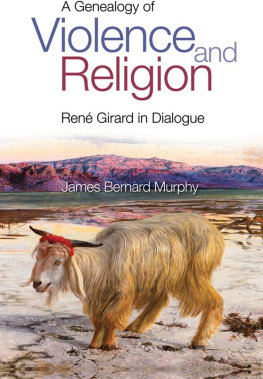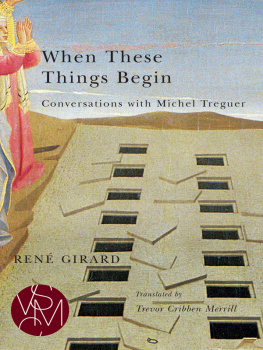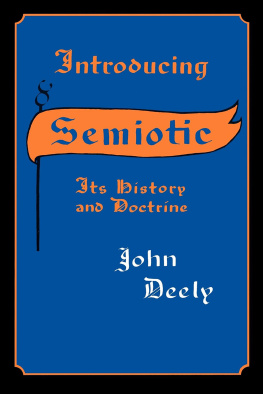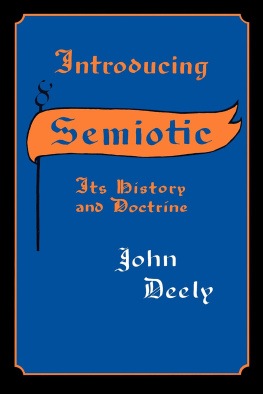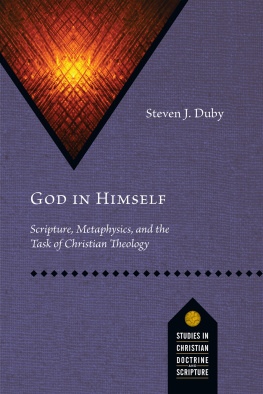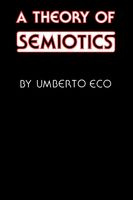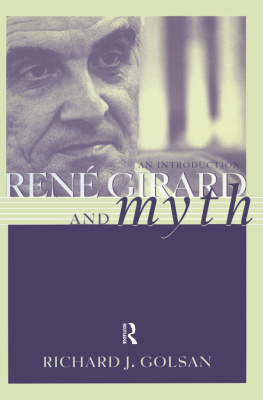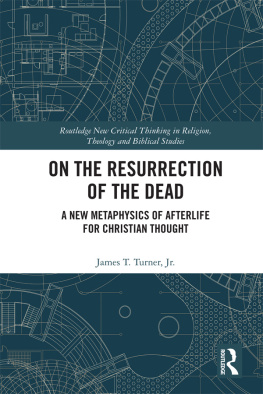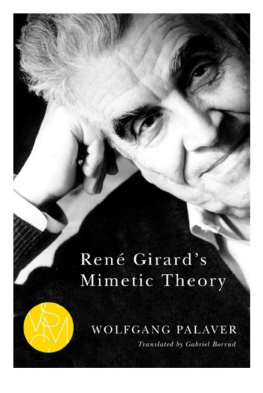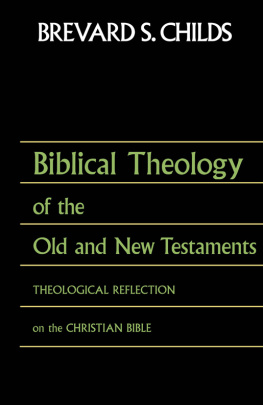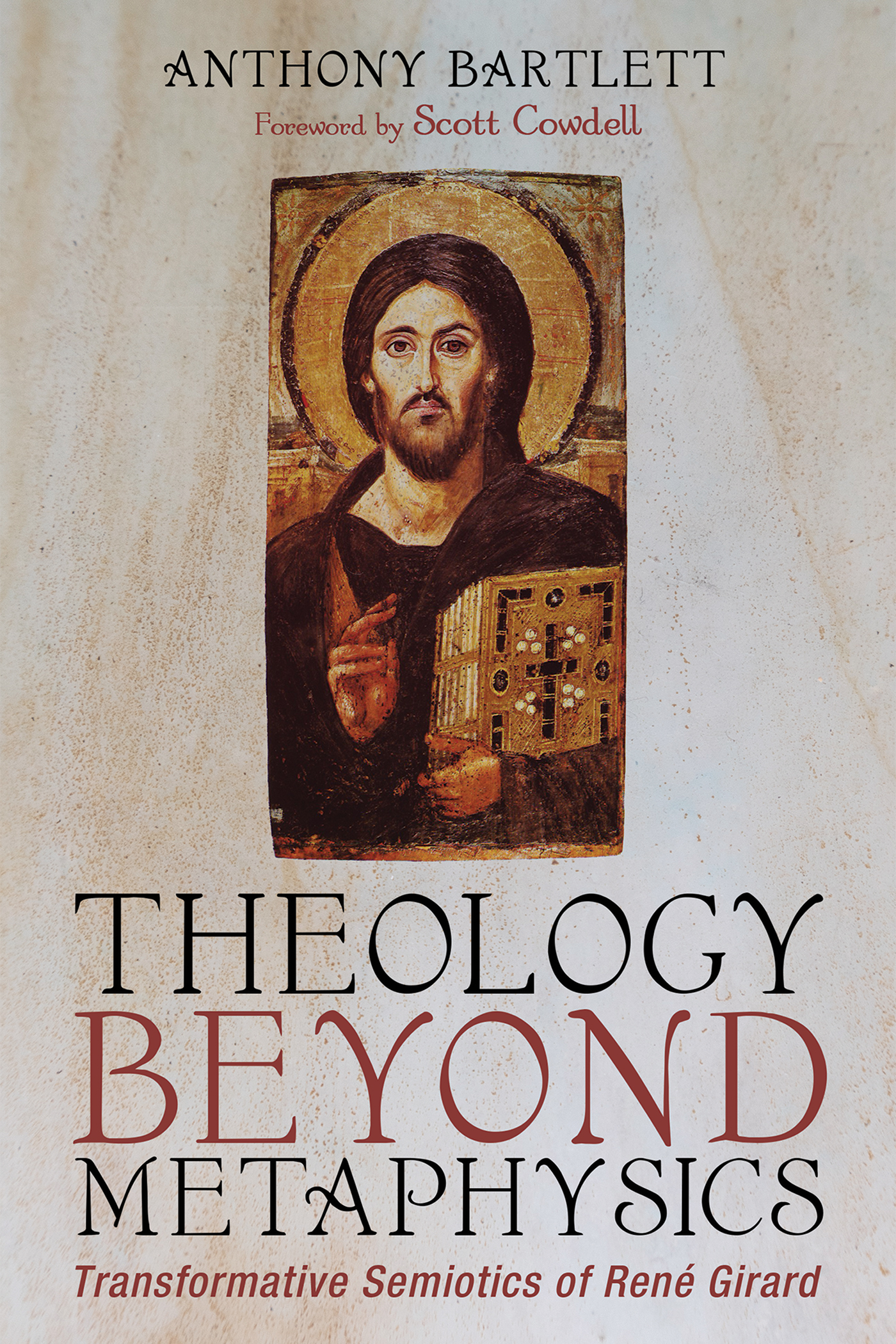In his cutting-edge book, Theology Beyond Metaphysics , Anthony Bartlett reveals the radical way in which God has intervened to liberate and reconstitute human consciousness, transforming it from the inside out with language-signs of nonviolence. I am grateful for its hopeful vision: that the new beginning inaugurated by Jesus is in our day coming to full clarity, with an urgency that cannot fail to transform human reality.
James Warren , author of Compassion Or Apocalypse: A Comprehensible Guide To The Thought Of Ren Girard
For anyone interested in the theological application of the thought of Ren Girard, Tony Bartlett has long been essential reading. Here he outdoes himself in the clarity with which he makes potentially complicated matters simple. He brings us to the heart of why and how Girards insight communicates an epochal shift in lived understanding of both the gospel and what it means to be human. Deep grazing, to which I will have to return to learn more.
James Alison , Catholic priest, theologian, and author
Bartlett has an expansive vision with the sign at its center. Unfolding it evocatively through Girard, Heidegger, Marion, and the lesser known but no less rewarding semiotics of John Deely, he arrives at Johns Gospel, in the company of the Beloved Disciple, to discover Christ as the transformative sign that makes all things new.
Susannah Ticciati , Reader in Christian Theology, Kings College London
In this important book, Anthony Bartlett draws on Ren Girards biblical anthropology in vital and telling ways. By engagingand winningly explainingadvances in semiotics, he rewrites intellectual history. His analyses decouple theology from its unwieldy partnership with metaphysics, while mining key insights in philosophical tradition from Aquinas through Peirce, from Heidegger through Derrida, from Vico to Lvi-Strauss.
Andrew J. McKenna , Emeritus Professor of French, Loyola University Chicago
In this paradigm-shifting work, Anthony Bartlett unfolds poetic language, potent descriptors, and powerful artifacts for dynamically revealing God as nonviolent. Though this is a deeply philosophical work, this book is an astonishing revelation that should be witnessed to around tables, from the pulpit, and even on our interwebs. Bartlett has given us an invaluable resource for telling a better story to the worlds we inhabit.
Dan White Jr. , co-founder of The Praxis Gathering and author of Love Over Fear
Theology Beyond Metaphysics
Transformative Semiotics of Ren Girard
Anthony Bartlett
foreword by Scott Cowdell
To Bethany House Community, 2014 , which along the road of its individual and group studies provided pressing inspiration for the theoretical work here. And, above all, to my wife, Linda, ever at the heart of the journey.
Neither revolution nor reformation can ultimately change a society, rather you must tell a new powerful tale, one so persuasive that it sweeps away the old myths and becomes the preferred story, one so inclusive that it gathers all the bits of our past and our present into a coherent whole, one that even shines some light into the future so that we can take the next step.... If you want to change a society then you have to tell an alternative story.
Ivan Illich
This is the covenant that I will make with the house of Israel after those days, says the Lord : I will put my teaching in their inmost parts, and I will write it on their hearts.
Jeremiah :
How was it possible, when I sat down in the parlor at my prehistoric desk, to use this code language of rape and murder? I was alone in this great hemisphere of violence, but I was not alone as far as the human race was concerned. I was lonely amidst a world of things lit up by the phosphorescent flashes of cruelty.
Henry Miller
Foreword
I ts not that metaphysics is bad, necessarily. Its not even that we need to get rid of it. Its just that a certain sort of metaphysics accompanies and indeed underwrites a bad theology. Anthony Bartlett urgently wants us to get past that bad theology so that we can begin to know and speak of God as God truly is, for the sake not only of truth but also of human liberation.
This problem we have with God has been thoroughly explored by Ren Girard, whose mimetic theory lies at the heart of Bartletts ongoing project. Famously, Girard theorizes the joint origin of religion and culture as the fortuitous outcome of cathartic violence, with a functional sacred emerging to scaffold humanitys linguistic, social, and institutional advance. Tactical dissimulation is essential for keeping this foundational violence under wraps, lest it lose its power to suppress further disorder. Hence the augmentation of protective rituals with every cultures prudent insistence on its miscellany of social prohibitions, to which is added the justification provided by an authoritative mythology.
Girard parses the myths of Western antiquity and a range of tribal cultures to unearth the scapegoat victims that stand behind them. He is enabled to do this because the prophetic texts of Hebrew Scripture and the Gospel Passion narratives do what social science has failed to do, by revealing real victims whose actual sacrifice underlies humanitys venerable structures. The Bible offers a different sacred, deconstructing mythology and redefining God in line with Jesuss praxis. Cross and resurrection reveal a God beyond the covert violence of humanitys various sacred orders, releasing a new imagination and a new praxis.
And so we come to metaphysics. Girard regards it as implicated in the larger mythical enterprise whereby we seek to know and inhabit the world as meaningful. He gives qualified support to Nietzsche, Heidegger, and Derrida in their critiques of Western metaphysics. Girard worries about Nietzsches unstable flirting with the Dionysian, about Heideggers mistaken concern that Christianitys God is a barrier to properly embracing the lifeworld, and about Derridas exclusion by diffrance of an elusive but nonetheless real origin of language and culture: the sacrificial victim. But he is certainly amenable to a critique of Western metaphysics. Enter Tony Bartlett.
Our author is chiefly a talented and creative interpreter of Scripture. Id even say exhilarating. His Girardian hermeneutic shows how text after text, book after book, both in the Hebrew Scriptures and the New Testament, can shed its accustomed readings to reveal a God beyond structuring violence. There is some of that textual engagement to be savored here, but the bulk of Bartletts biblical exegesis is being saved for a subsequent, companion volume. In the meantime, he seeks to clear the decks of metaphysical blockages so that Scripture can speak out clearly and make its fullest impact. Bartletts central conviction is that human structures, yoked to the eternal return of violence and its homoeopathically violent containment, are capable of being transformed. The false sacred can be undone, as we see happening at the first Easter.
Bartlett knows that metaphysics must accommodate historical change and that objective reality comes epistemologically entangled with the world as humanly known. But, like Girard, he is enough of a metaphysical realist to insist on real events that were concrete and decisive enough to change the human world, in particular events involving Jesus Christ. Bartlett resists so-called postmodern trends that sacrifice realism for relativism and a perpetual cascade of meanings. The die was cast for these trends in Descartess early modern split between the world and the knowing subject, which via Kant is perpetuated in modern philosophical accounts of the real. Close empirical attention from the phenomenologists to how we inhabit the lifeworld repositions this characteristically modern problem, though it hasnt resolved it. Bartlett looks elsewhere, to a premodern alternative that has reemerged in a philosopher whom he regards to be truly postmodern, C. S. Peirce. And that alternative is the science of signssemiotics.


